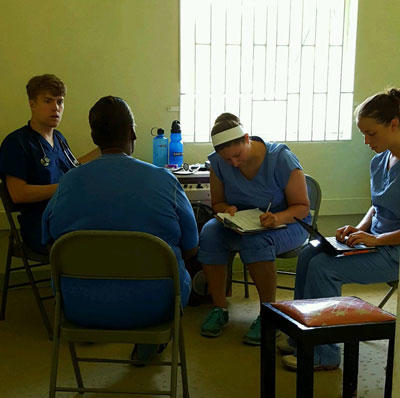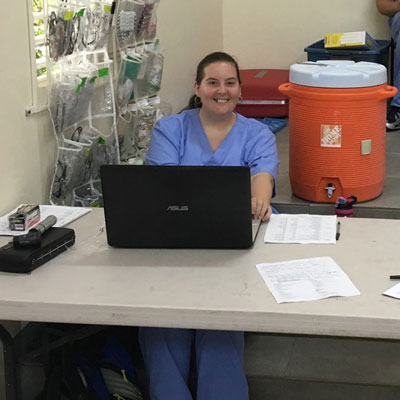Vital Signs » Summer 2018

When medical students Jennifer Gibson, Chloe Meyer, and Steven Platko went to Jamaica as part of the Boonshoft School of Medicine’s Global Health Initiative, they had two goals – help treat as many patients as possible in local clinics in an impoverished area and set up and implement an electronic medical record (EMR) system.
Now, two years later, their work on implementing an EMR system has resulted in better clinical care for a disadvantaged population. Now, volunteer physicians and medical students have access to vital signs, glucose results and prescribed medications, including dosages.
The trip took place in collaboration with American Caribbean Experience. The outreach ministry based in the parish of St. Mary, Jamaica, is dedicated to transforming the community through various initiatives in education, business, and health care.
Thomas Herchline, M.D., professor of internal medicine at the Boonshoft School of Medicine, leads the annual service trip to Jamaica. “This is probably the poorest parish in Jamaica,” he said. “We try to treat as many patients as possible.”
They treat as many as 800 patients during the two weeks on the island. Herchline saw a need for an EMR system. Very often, patients came to the clinics without their medicines, and they could not recall the names of medicines or dosages they were taking.
“This is something that I had wanted to do for a number of years,” Herchline said. “Previously, the only medical record was on paper. It was retained by the Ministry of Health and generally not available for clinics done in subsequent years.”
A big challenge was lack of Internet access where they have clinics. So, he asked the medical students to create an EMR system that did not rely on the Internet. The medical students jumped at the opportunity to create a new system. It also helped that this group of medical students works on computers as a hobby.
 Platko described how they customized software, called OpenEMR, a freely available open-source software that had been developed for establishing electronic medical records. The software had many of the features they already needed. Their adjustments consisted of formatting the menus appropriately to keep a high-volume outpatient clinic operating efficiently.
Platko described how they customized software, called OpenEMR, a freely available open-source software that had been developed for establishing electronic medical records. The software had many of the features they already needed. Their adjustments consisted of formatting the menus appropriately to keep a high-volume outpatient clinic operating efficiently. “Knowing that we did not have access to Internet and even electricity at times made us simplify the systems as much as possible before we arrived in Jamaica,” Platko said. “Most of the residents in Jamaica have little access to regular health care. As a result, the clinics tend to have a high volume of patients. However, they did not complain about having to wait a long time to see us.”
The medical students installed the OpenEMR program onto a dedicated laptop. This served as the host computer where all patient records are securely stored. They connected the host computer to a router, which allowed them to broadcast a local area network. It acts as Wi-Fi that allows other devices to connect to the host computer but not the rest of the Internet. Clinicians then used their own devices to connect and access patient records using any browser on their laptop computers or tablets.
After setting up the EMR system, the medical students left instructional video recordings on how to navigate it. The software also is intuitive to operate. Most groups were comfortable with the software soon after a brief instruction from those who had used it before. Multiple practitioners who have traveled to Jamaica for medical, dental, and orthopaedic medical mission trips have used the EMR system.
“Our medical students were instrumental in setting up and implementing an EMR system for the clinics being done in partnership with the American Caribbean Experience in Jamaica,” Herchline said. “It has been very helpful to have specific information available at repeat visits.”
While Gibson and Platko were the technological leads on the project, Meyer provided support and created a survey that was sent to those who use the EMR. “We truly believe that everyone deserves quality health care,” Meyer said. “We are hopeful that this project will continue to blossom and help provide better care for the people of St. Mary Parish in Jamaica.”
Gibson was amazed at the rare opportunity they were given to make a lasting impact and help improve health care delivery for these patients. “With only two weeks, you usually aren’t able to really change anything when you go on medical service trips,” Gibson said. “But we were able to put a system in place that has aided this patient population for three years. That’s really exciting to me.”
Platko appreciated the opportunity to apply a skill completely unrelated to medicine to benefit patients. “When things are outside of the guidelines or protocols we learn in class, it is great to have resourceful and skilled people to solve the problem and make a difference,” he said. “The continued clinics by the multiple medical groups that serve the communities in Jamaica improve the lives of the people. We hope that our EMR project will allow the providers to be more efficient and effective in their visits with patients.”
— Heather Maurer

